English | Dutch |
|
| Edwin & Ivonne: Backpack Terrorists? | |
Warsaw (Poland), November 30th 2015
|
|
| |
|
Returning to the European Union is normally just a formality for us. At EU airports, border control usually only checks the passports on authenticity without entering anything into the computer system. At the European external land borders, control is normally a little bit more extensive. Immigration official take the passport through a scan, but that's usually it. But things changed in Europe last months. The combination of the massive influx of refugees, mainly from the Middle East, and the terrorist attacks of IS (Islamic State) do shake Europe to its foundations. Europe is about to change forever. Some countries have already changed their mind set to this new reality, often because they passed already the point of no return, while others oppose with tooth and nail. This is roughly the East-West division in Europe that can threaten the existence of European Union as we know it today. Poland is a typical representative of Eastern Europe. Poland is since World War II and the subsequent migration periods, a largely homogenous population. Nearly 90% of Poles are Catholic and the number of foreigners is almost negligible. Poland has indicated that they wish to keep it that way, proofed by the victory of the conservative opposition party called Law and Justice (PiS) of former Prime Minister Jaroslaw Kaczynski. Not only is the party against the adoption of large numbers of refugees, the party is also critical of the introduction of the Euro in Poland, which the country still does not use. The misery that now pours over Western Europe, is for many Poles the proof that the country is on the right track and that they should not blindly follow the West European policies, even if this leads to clashes with the rest of Europe. That Poland used to be an emigration country themselves during the cold war, and even more recently when the Poles were allowed to work in the rest of Europe, seems to have no influence. The Poles are especially very afraid of immigrants from outside the EU (non-Western immigrants) and they look with horror at the larger Western European cities where ghettos full of underprivileged immigrants occurred in the last decades. The residents of these neighbourhoods are moving more and more away from the autochthonous society and some areas turn out to be breeding grounds for fundamentalists. That strengthens the Poles to do it differently. And in that view they seem to be almost unanimously. |
|
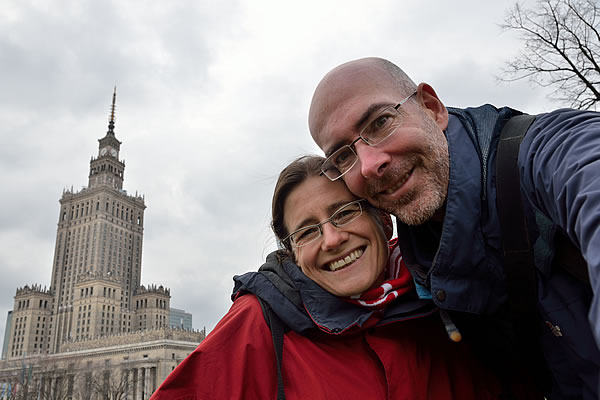 |
|
A Selfi in front of the iconic Palace of Culture in Warsaw |
|
And exactly in this period we entered Poland from outside the EU with a passport full of stamps and visas from (conservative) Islamic countries. We just left Belarus and are sitting in a bus full with Belarusian travellers, crossing the river that separates Belarus and Poland. We are back home is what we say to each other; back in the EU. The bus stops at the Polish immigration post and two border guards enter the bus to check passports. We thought: "What a service. They handle the procedures when we can stay relaxed in the bus." The border guards are equipped with a wireless tablet on which a finger print scanner and passport scanner are connected. One border official starts in the back of the bus and the other at the front. We are in the middle, so we will be last to be served. We give our passport with the idea that we would get it back again within a minute. The passport is scanned and then the officer starts browsing through the passport, just for the formality. After he has seen the passport completely, he starts again. It is quite dark in the bus, so he regularly brings the passport all the way to his face the judge one of the stamps or visas. We used this passport mainly for our travels in recent years through the Middle East, the Gulf region and Central Asia. That’s why he notices, amongst others, visas of Iran, Tajikistan, Uzbekistan, Turkmenistan and Kazakhstan. In addition there are stamps of Iraq, Kyrgyzstan, Kuwait, Bahrain and Qatar. What does not help is that our passport is not issued in Amsterdam or Eindhoven, but in the Malaysian capital Kuala Lumpur. And let that be an Islamic country as well. He looks at us again carefully, and then gives us back the passports. In the meantime, his colleague is finished with the front part of the bus. They start talking to each other and soon we hear the Polish names of ‘Netherlands’, ‘Iran’, ‘Uzbekistan’ and ‘Russia’ in their conversation. We also have some Russian visas in our passports and that is weird for a Pole. Why would anyone go to Russia for a holiday? The border guard who checked our documents comes back to us and asks to see the passports again. Now both of the officials browse through the passports thoroughly. They ask us several questions like what we have done in these countries and whether we have family living over there. And why have we been in Iran three times? We see they are in doubt about what to do. Should they just let us go, or are we potential terrorists? They opt for the second option. They tell us that we need to have more patience and leave the bus with our passports, probably on their way to their superior. The passengers in the bus start to look at us and whisper to each other. You hear them think: "There are only two people on the bus with an EU passport, and they are the people who are suspected of something". | |
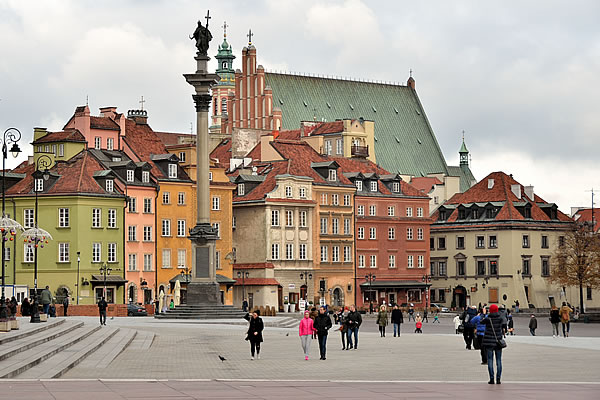 |
|
The fabulous old city centre of Warsaw |
|
It the meantime it has become pitch dark and the bus driver and hostess are becoming impatient. We get a little bit nervous too. What is going on here? But we comfort ourselves with the fact that we have done nothing wrong. The countries we visited are not that weird. We have not been in Syria, we were in Iraq before the rise of IS and Iran is even an opponent of IS. In Central Asia, there are some countries where they have problems with Islamic radicalization, but we have that problem in Western Europe as well. Eventually the officers returned, accompanied by a superior who is on the phone with probably his superior, or perhaps even the Polish department of counterterrorism. They want to search our bags. I (Edwin) leave the bus while Ivonne stays in. Our bags are already taken out of the bus. I open Ivonne's backpack and show what's inside. Ivonne is in the bus witnessing the fact that Russian fellow passengers sit with their noses against the window to see what happens with me. Some even put off their reading lamps to avoid the reflections in the glass, which obstructs the view. A few of them calls home and hears Ivonne with her limited knowledge of the Russian language, that they report what’s going on. Perhaps they even want to say goodbye to their friends and family just in case these two Dutch backpackers will blow up the bus. During the search of the bags, I answer a few standard imposed questions by the officials. The answers are translated by the officials into the Polish language and passed on to their superior with the phone, who passes the answer on to God knows who on the other side of the phone. After they saw our slippers, underwear, pots of cooking herbs and the panty liners of Ivonne, they are convinced. These backpackers are not terrorists. Our bags are loaded back into the bus again and we get our passports back. Edwin returns to his seat in the bus and after one hour of additional delay, the bus moves again to the delight of the other bus passengers. There is still a lot of whispering going on. Edwin sends an app to his parents to report that we are safe in the EU again, but that we had some issues with immigration. He gets a brief message back: "Did you grow a beard? ". Eventually everything was fine. We just never expected that this would happen to us. On the other hand, it is perhaps understandable, given the current situation in Europe. We obviously have a passport full of stamps from countries that currently do have a good image and we can imagine that the border guards were in doubt about this. We said to each other: "What would have happened if we were not named Edwin and Ivonne but Mohammed and Fatima? Would that have led to a different outcome or would they have send us back to Belarus?" |
|
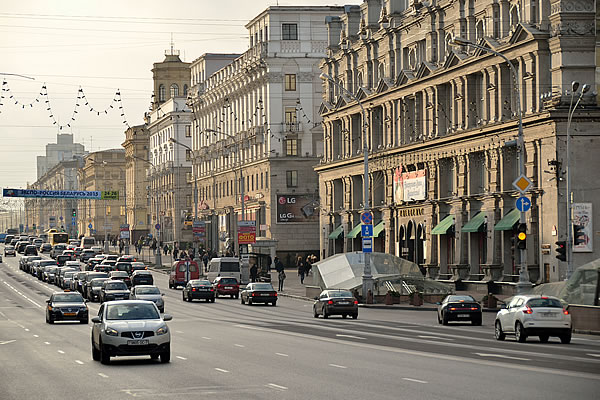 |
|
A Soviet style wide boulevard in Minsk |
|
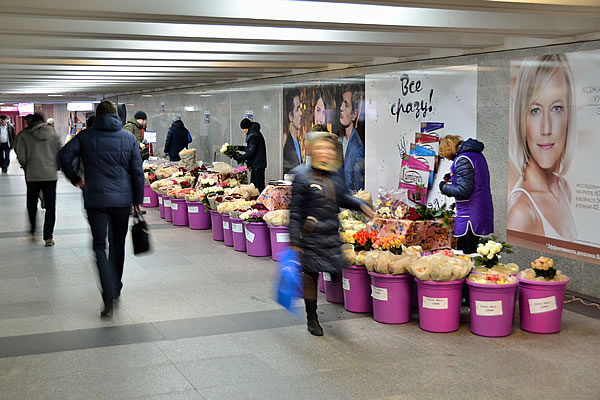 |
|
Flowers for sale in the metro of Minsk |
|
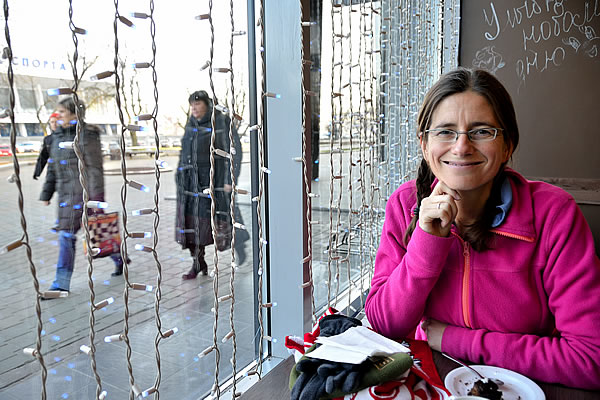 |
|
Time for coffee and cake in icy cold Minsk |
|
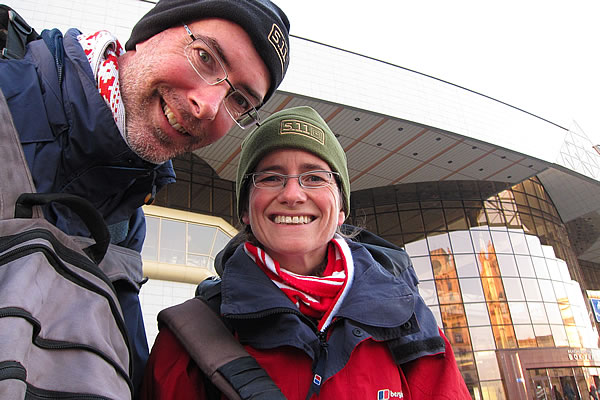 |
|
On the way with our backpacks to the bus station of Minsk |
|
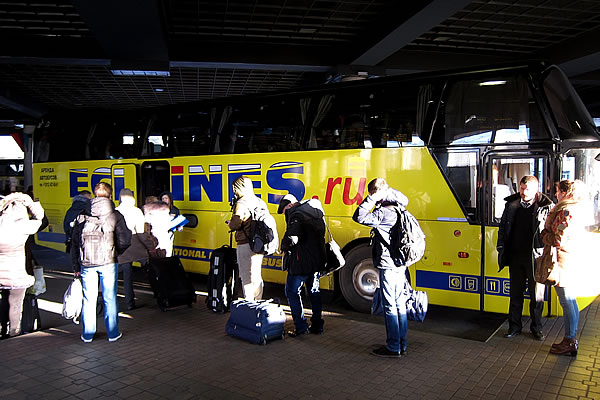 |
|
With Ecolines.ru back to Warsaw in Poland |
|